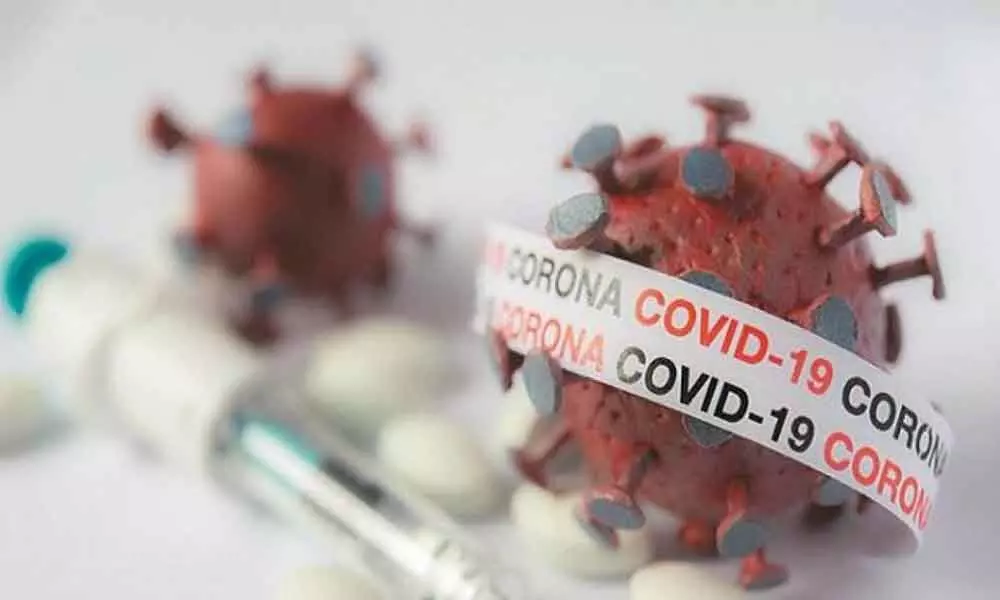Covid-19 antibodies found in 16% people in State: Government survey

Covid-19 antibodies found in 16% people in State: Government survey
At least 1.93 crore or 27.3 per cent of the people in Karnataka are either infected with coronavirus or had the infection in the past, as of 16 September, revealed a survey conducted by the government to estimate the prevalence of coronavirus in the State.
Bengaluru: At least 1.93 crore or 27.3 per cent of the people in Karnataka are either infected with coronavirus or had the infection in the past, as of 16 September, revealed a survey conducted by the government to estimate the prevalence of coronavirus in the State.
The survey further revealed that around 16% of the population in Karnataka developed antibodies against coronavirus, says Health and Medical Education Minister Dr K.Sudhakar on Wednesday.
The minister said, "A survey to estimate the prevalence of Covid-19 was carried out from September 3-September16. This included the proportion of people who had COVID-19 infection recently and those currently having active SARS-CoV-2 infection. The sampled population surveyed were all adults aged 18 years and above. All 30 districts of the State, including eight zones of BBMP, were included in the survey conducted in hospitals and selected population settings."
According to the reports, three groups of the population were covered such as low-risk group (pregnant women attending antenatal clinic, persons attending outpatient department in hospitals/attendees of children or patients), moderate-risk group (persons moving in the community like bus conductors, vendors at the vegetable markets, healthcare workers, individuals in containment zones and congregate settings such as markets, malls, retail stores, bus stops, railway stations, pourakarmikas/ waste collectors) and high-risk group (elderly and persons with comorbid conditions).
"The study used Rapid Antigen Test (RAT) and RT-PCR for the diagnosis of acute infection. At the same time, serum testing for IgG antibodies was conducted to find out the protection offered by the immune response. The standard ICMR protocols were used, and an ICMR approved laboratory network in the State was utilized" Sudhakar further added.
Of the 16,585 persons surveyed covering the three risk categories, the analys was done on results for 15,624 individuals whose RAT plus RT-PCR and COVID Kavach ELISA antibody test results were matched in the line list.
Sudhakar explained that the survey revealed that, 16.4% of the people were infected in the past and found to have antibodies against the virus among the surveyed population. This figure is 29.1% in Delhi, 16% in Mumbai non-slum settings, 57% in slum settings, 36.1-65.4% across five prabhags in Pune, 7.8% in Indore, 22.7% in Puducherry, and 32.3% in Chennai. The national seroprevalence survey conducted by the Indian Council of Medical Research found a seroprevalence of 0.7% in the first round (May) and 7.1% in the second round (August-September).
Both rounds were conducted in 70 districts of the country. All these surveys capture only the evidence of infection in the past (IgG). The surveys done in other States were limited to capture information only within the confined limits of the metropolitan area. The minister also claimed that compared to other studies in India, the survey undertaken in Karnataka captured total prevalence, including information on both current and past infections. The participants were included from locations centred around 290 hospitals spread throughout Karnataka. The survey employed all three tests: Rapid Antigen, RT PCR, and antibody (IgG).
The study recommended establishing district-level facility-based sentinel sero-surveillance to systematically monitor the trend of infection in the long term.
The minister said that a follow-up survey has been planned to measure the extent and speed of transmission and evaluate the impact of containment strategies over time in the State.
Sharing details of the findings, Karnataka Health Minister Dr K Sudhakar said the survey was carried out from September 3 to 16 across 30 districts in the state.
According to Sudhakar, the state government wanted to ascertain the pace at which the COVID-19 cases were increasing. "The government has to have clear information on how it is spreading in the community in the districts, how to prevent its spread and action to be taken. Hence, this survey was conducted," said the minister. The sample size is 16,585 in the entire state. Of this, the test reports of 15,624 have been submitted, he added. Besides the Rapid Antigen Test and the RT PCR, IgG test was also carried out. Immunoglobulin G (IgG) is the most common antibody in blood and other body fluids, which protects against the bacterial and viral infections. It is developed after an infection or immunisation. The survey also found that the infection fatality rate due to COVID-19 was 0.05 per cent.
"Out of 7.07 crore estimated population in Karnataka, the study estimates that 1.93 crore (27.3 per cent) of the people are either currently infected or already had the infection in the past, as of 16 September 2020," the report said. It further stated that the present IFR is likely an underestimate. The overall IFR based on the first round of sentinel serosurvey findings is 0.07 per cent. Based on the report, it is estimated that the overall weighted adjusted seroprevalence of IgG was 16.4 percent. "It suggests that in the surveyed population, 16.4 per cent of the people were infected in the past and found to have IgG antibodies against SARS CoV-2," the finding revealed.
The report mentioned that the districts with a high Infection Fatality Rate (IFR) need clinical care to be improved.
Noting that the state was passing through different stages of COVID-19 pandemic in different districts, the report said the surge in cases is yet to occur in the districts with the lowest estimated prevalence of COVID-19 such as Dharwad, Gadag, Chikkaballapur, Bagalkot, and Mahadevapura in Bengaluru urban district. The study recommended establishing the district-level facility-based sentinel sero-surveillance to monitor the trend of infection in the long term systematically.
This can inform local decision-making at the district level to mount the necessary public health response towards the COVID-19 epidemic in Karnataka.
The government said that a follow-up survey has been planned to measure the extent and speed of transmission and evaluate the impact of containment strategies over time in the state. PTI










